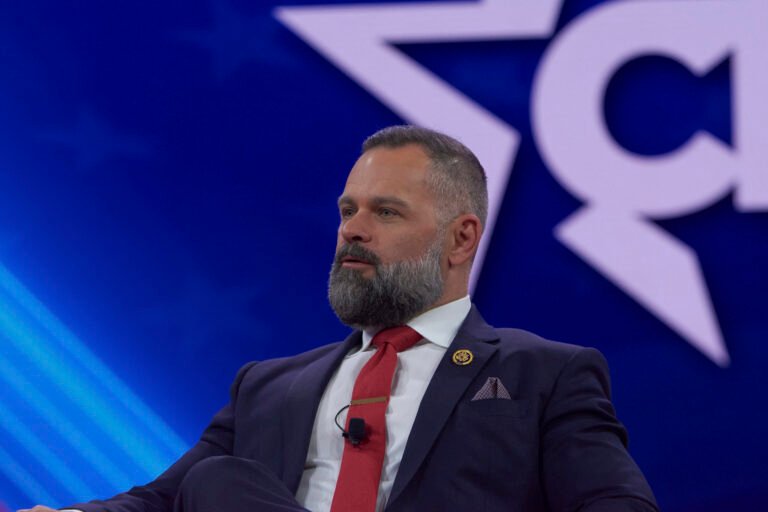
Few cultural figures have triggered the academic elite more effortlessly than Sydney Sweeney. Her recent American Eagle ad campaign — featuring a young woman in denim Americana, smiling beneath sunlight — was met with ideological panic.
To the untrained eye, this appeared to be another social media overreaction. It wasn’t. It was a reaction calibrated by the very institutions that claim to shape young minds, but in practice, infect them with fear. And the outrage didn’t originate in Generation Z, but in the aging adults who taught them to distrust anything unexamined or un-theorized, and to treat freedom, joy, and beauty with suspicion.
Sweeney’s image didn’t threaten academia because it was political. It threatened academia because it wasn’t political at all.
In showcasing her “great jeans,” Sweeney doesn’t posture. She doesn’t apologize for her “privilege” — whether attractiveness, “whiteness”, or able-bodiedness. She doesn’t pretend that her ads are activism. She simply exists — luminous, intact, and unburdened by the guilt that academia falsely equates with social awareness. Her image disrupts the narrative that joy signifies ignorance of ongoing injustices.
The backlash to these ads wasn’t spontaneous. It was incubated in elite institutions. According to a 2023 FIRE study, 63 percent of college students say they cannot express their honest opinions on campus. Among conservative students, that figure jumps to 74 percent. This reflects a system of ideological conditioning, in which compliance is rewarded and dissent pathologized.
Pedagogy in higher education is increasingly rooted in projection rather than education. A 2022 Chronicle of Higher Education report found that 42 percent of tenured professors under 55 express “frequent regret” about their careers. Among identity-focused departments, that number exceeds 60 percent.
Steeped in postmodern theory, which flattens human complexity into a rigid oppressor-oppressed binary, these professors have deconstructed beauty, joy, and meaning to the point of alienation. Their fixation on moral relativism erodes any stable sense of ethical significance or intrinsic purpose in their actions. Rather than confront their own disillusionment, many professors offload it onto students, teaching them to similarly deconstruct both themselves and the world around them into existential oblivion.
It is no coincidence that student mental health has collapsed under this ideological regime. In 2024, the American College Health Association reported that 77 percent of students experienced “overwhelming anxiety” — a 33 percent increase over a decade. This is not accidental, but the predictable consequence of drilling it into the heads of an entire generation that happiness is selfish and confidence is unsafe.
Moreover, today’s curricula often encourage students to devalue and disavow any aspect of identity not classified as “marginalized,” such as maleness or heterosexuality. A 2023 NAS report found that 76 percent of top universities require diversity statements for faculty hiring, a means of engineering conformity to this orthodoxy. Simultaneously, the line between cognitive discomfort and psychological harm has blurred so much that honest debate is treated as an emotional assault. Students aren’t simply acquiring knowledge — they are internalizing confusion and anxiety, while learning to signal social belonging by policing others’ ideological alignment.
A figure like Sweeney — marked by ease, absence of political dog whistles, and comfort in a traditionally beautiful body — quietly opposes this climate. She does not align with activist causes, making her invulnerable to ideological attacks. Resisting deconstruction and theory, she remains illegible to the academy.
She thus represents a loss of control for the prevailing ideological apparatus, which demands punishment. Her campaign is read in bad faith as complicity with oppression, despite her neutrality. She is scapegoated not because she provokes, but because she doesn’t: Her femininity goes unexplored, her body isn’t a battleground, and her looks are not an indictment of the structural powers-that-be. In a moral order built on struggle, her wholeness is heresy. She threatens by refusing to seek validation from frameworks demanding constant self-scrutiny. She simply is—a direct affront to those who built careers teaching that selfhood must always be in crisis.
This is not a critique of students but a reckoning with the adults who taught them to see “silence”, or political neutrality, as violence.
From a clinical perspective, this is projection-driven moralization: unresolved internal dissatisfaction externalized as political critique. The backlash against Sweeney is affective transference on a generational scale. A disoriented intellectual class now enforces fragmentation as virtue — replacing self-awareness with institutionalized self-rejection and calling it progress.
The culture war is no longer generational but institutional. It’s not left versus right, but between those who believe the human spirit can exist without ideological oversight — and those who cannot imagine that possibility.
Sweeney didn’t harm anyone. She disrupted a schema. And for academics whose authority relies on perpetually locating grievance to prove their relevance and justify their role, that kind of disruption is intolerable.
Kevin Waldman and Forest Romm are clinical psychology researchers at Northwestern University. Waldman specializes in male psychology, examining how cultural narratives and social expectations shape masculinity and emotional development. Romm focuses on female psychology, exploring the impact of media, sexuality, and trauma on women’s identity and mental health.


